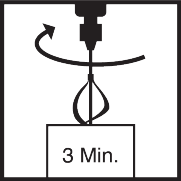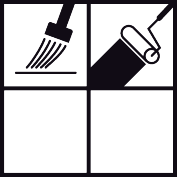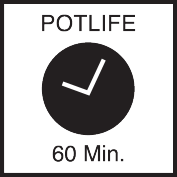Article No. 601126
Water-based impregnation agent and primer
Product specifications
Component A
Component B
Mixture
The stated values represent typical product characteristics and are not to be construed as binding product specifications.
Field of application
- Primer in Remmers water vapour diffusion (WDD) systems
- Impregnation of mineral substrates
Properties
- Excellent adhesion on many substrates
- Water vapour diffusion capable
-
Preparation
-
Substrate requirements
The substrate must be firm, dimensionally stable, capable of bearing loads and free of loose constituents, dust, oil, grease, rubber marks and other substances that could interfere with adhesion.
The tensile strength of the surface of the substrate must be at least 1.5 N/mm² on average (smallest individual value of at least 1.0 N/mm²), and the compressive strength must be at least 25 N/mm².
Substrates must have reached their moisture balance and must also be protected against moisture penetration from the reverse side, including during use.
Concrete max. 6 m% moisture Cement screed max. 6 m% moisture Anhydrite screed max. 0.3 m% moisture Magnesite screed 2-4 m% moisture In the case of anhydrite and magnesite screeds, moisture cannot be permitted to penetrate from building elements or the ground.
As a general principle, systems which permit the diffusion of water vapour are recommended for use with anhydrite and magnesite screeds.
-
Preparations
Prepare the substrate by suitable means, e.g. steel shot blasting, so that it meets the specifications listed above.
Broken-out or missing areas in the substrate should be filled flush with the surface using Remmers RM systems (RM = Repair Mortar) or Remmers EP mortars.
-
-
Preparation
-
Combination container
Add the entire quantity of the hardener (component B) to the base compound (component A).
Mix thoroughly with a slow-speed electric mixer
(approx. 300 - 400 rpm).Pour the mixture into a separate container and mix again thoroughly.
Mix for at least 3 minutes.
Insufficient mixing is indicated by streaks forming.
When using on highly absorbent substrates, mix the product with up to 20% by mass of water as necessary.
-
Application
-
The times given are reduced at higher temperatures and increased at lower temperatures, in particular in combination with high humidity.
-
Working tools / cleaning
-
Paintbrush, rubber scraper, epoxy roller, mixer
-
More detailed information can be found in the Remmers Tool Programme.
Clean tools, equipment and any splashed material immediately with water while still fresh.
Take suitable protective and waste disposal measures when cleaning.
-
Storage / shelf life
-
If stored unopened in its original container in a cool, dry place and protected against frost, the product will keep for at least 12 months.
-
Usage
-
See application examples
-
-
Application examples
-
IS
Dilute the material with water up to 10 M-% and pour onto the surface until saturated. Spread with suitable accessories, such as a rubber slider, and then work into the substrate with an epoxy-roller.
It may be necessary to apply several layers.
approx. 0.20 - 0.50 kg/m² binder (depending on the substrate)
-
P
Apply the mixed resin generously to the surface. Distribute with a suitable tool, e.g. rubber blade, and work into the substrate with an epoxy roller so that pores in the surface of the substrate are completely filled.
It may be necessary to apply several layers.
approx. 0.20 - 0.30 kg/m² binder (depending on the substrate)
-
-
General information
-
Unless otherwise specified, all of the values and application rates given above have been determined under laboratory conditions (20 °C). Slight deviations from these values may arise if the product is worked with on site.
Primers must always be applied so that all pores are filled; it may therefore be necessary to increase the application rate or to apply a second coat.
Wetting problems are possible on non-absorbent or slightly hydrophobic substrates. In this case, the priming must be repeated a second time.
As mineral substrates have different absorption capacities, impregnated surfaces have a spotted appearance. Not suitable for high-visibility surfaces.
Epoxy resins are generally not colourfast when exposed to UV light or weather.
The end of the pot life cannot be recognised by increased viscosity or temperature, thus the max. working time must be strictly observed.
Abrasive mechanical loads leave traces of wear.
Further notes on working, system construction and maintenance of the listed products can be found in the latest Technical Data Sheets and the Remmers system recommendations.
-
-
Disposal instructions
-
Larger quantities of leftover product should be disposed of in the original containers in accordance with the applicable regulations. Completely empty, clean containers should be recycled. Do not dispose of together with household waste. Do not allow to enter the sewage system. Do not empty into drains.
-
-
Safety / regulations
-
For professional users only!
For further information on the safety aspects of transporting, storing and handling the product and on disposal and environmental matters, please see the current Safety Data Sheet and the brochure entitled "Epoxy Resins in the Construction Industry and the Environment", issued by Deutsche Bauchemie e.V. (3rd edition 2022).
-


















